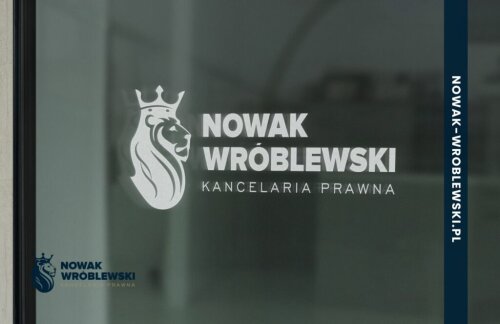Best Funds & Asset Management Lawyers in Tarnobrzeg
Share your needs with us, get contacted by law firms.
Free. Takes 2 min.
List of the best lawyers in Tarnobrzeg, Poland
1. About Funds & Asset Management Law in Tarnobrzeg, Poland
Funds and asset management in Tarnobrzeg are governed by national Polish law, with local practitioners applying it to residents and businesses in this city. The core framework is built around investment funds, asset management companies and the supervision of market participants by the Polish Financial Supervision Authority (KNF). Local lawyers help clients understand obligations, draft agreements and navigate enforcement actions.
Understanding these rules is essential for anyone considering starting a fund, investing in funds or managing assets on behalf of others. Practical issues include licensing, investor disclosure, fiduciary duties, and complaint processes with supervisory authorities. In Tarnobrzeg, as in other Polish towns, the legal process often involves coordinating with national regulators while handling local civil or administrative procedures.
2. Why You May Need a Lawyer
A local Funds & Asset Management attorney can help with concrete, real world situations in Tarnobrzeg and the surrounding region. For example, if you are a Tarnobrzeg resident who suspects mis selling by a local asset manager, a lawyer can advise on reports to KNF and civil action options.
Another scenario involves starting a new investment fund or a management company that will operate from Tarnobrzeg. A lawyer can guide you through licensing, documentation, capital requirements and ongoing regulatory compliance.
If you are part of a family or business trust with fund assets, a solicitor can help with asset protection, succession planning and proper transfer of interests in line with Polish trust and inheritance rules.
Disputes over fees, performance, or misrepresentation by a fund administrator are common. A local attorney can assess contract terms, pursue remedies in Tarnobrzeg courts or in KNF channels as needed.
For individuals considering cross border investments or distributing a Polish fund to non residents, a lawyer ensures proper regulatory alignment with EU and Polish rules, including disclosure and anti money laundering requirements.
3. Local Laws Overview
Ustawa z dnia 27 maja 2004 r. o funduszach inwestycyjnych - the Investment Funds Act, governing formation, operation and supervision of investment funds in Poland. This act sets requirements for fund vehicles, distributors and investment fund management companies. Official texts are published in the Journal of Laws and are periodically amended to reflect European directives. For primary source text, see Dz.U. on the government site. Dziennik Ustaw.
Ustawa z dnia 29 lipca 2005 r. o obrocie instrumentami finansowymi - the Act on Trading in Financial Instruments, which covers market conduct, disclosure, licensing and supervision of participants in the Polish securities market. It is central to fund managers, brokers and distributors handling funds in Tarnobrzeg. Official information is available through the Journal of Laws and KNF guidance. Dziennik Ustaw.
MiFID II transposition and related supervisory framework - the EU framework for investment services and market regulation, implemented in Poland through national law and KNF supervision. While the explicit Polish title varies by amendment, compliance obligations include investor protection, scope of licenses and conduct of business. See KNF guidance for Polish implementation details. KNF.
Local context in Tarnobrzeg means coordinating these national rules with practical steps such as preparing fund prospectuses, investment management contracts, distribution agreements and AML procedures. For reliable text and updates, refer to official sources listed below.
Investment funds in Poland are regulated by the Investment Funds Act and supervised by the KNF, ensuring investor protection and market integrity.
Key authorities and official resources include the Journal of Laws (Dz.U), the Sejm or government portals, and the KNF’s enforcement guidance. These sources provide the definitive texts and updates you need for compliance and risk management. KNF, Dziennik Ustaw, Gov.pl Finanse).
4. Frequently Asked Questions
What is a Funds & Asset Management lawyer in Tarnobrzeg?
A Funds & Asset Management lawyer advises on funds structure, licensing and regulatory compliance for Tarnobrzeg residents and businesses. They prepare agreements and handle disputes with KNF or courts.
How do I start a new investment fund in Tarnobrzeg?
You need a licensed management company, a clear prospectus, and regulatory approval. A local attorney coordinates documentation and filing with KNF.
What is the Investment Funds Act in simple terms?
The act defines fund types, governance, disclosure duties and investor protections. It also sets licensing and supervisory standards for fund managers.
How long does it take to obtain regulatory approval for a fund?
Approval times vary by fund type and complexity but typically range from 3 to 9 months after complete documentation.
Do I need a Tarnobrzeg lawyer to manage funds locally?
While not mandatory, a local lawyer helps meet local court procedures, licensing steps and local market practices efficiently.
What are typical costs in funding a new investment fund?
Costs include licensing fees, legal drafting, regulatory reporting and ongoing compliance. A lawyer can provide a detailed budget.
Can I file a complaint against a fund manager with KNF?
Yes. KNF handles supervisory complaints and may require supporting documents from you. A lawyer can help prepare materials.
Should I choose a Polish law firm or an international firm for funds work?
Polish firms understand local procedures, language and courts; international firms offer cross border expertise if needed.
Do I need to understand UCITS or MiFID II when investing in funds?
Yes. UCITS and MiFID II principles affect investor protection, advertising and reporting requirements for funds.
Is there a difference between a fund manager and an investment adviser?
Yes. A fund manager typically operates a fund and holds regulatory licenses; an adviser may provide tailored investment recommendations.
How do I find a qualified Funds & Asset Management attorney in Tarnobrzeg?
Ask for regulatory references, verify licenses and review case histories. A local bar association can provide vetted referrals.
5. Additional Resources
- KNF - Komisja Nadzoru Finansowego - official regulator overseeing investment funds, asset management and securities markets in Poland. Function: supervision, licensing and enforcement. https://www.knf.gov.pl/
- Journal of Laws (Dziennik Ustaw) - official publication of Polish laws, including the Investment Funds Act and the Securities Trading Act. Function: provides the exact legal texts and amendments. https://dziennikustaw.gov.pl/
- Gov.pl Finanse Section - official government portal with guidance on financial markets, funds and consumer protection. Function: public guidance and regulatory updates for residents. https://www.gov.pl/web/finanse
6. Next Steps
- Define your objective and gather all relevant documents within 1 week. This includes contracts, statements, and any correspondence with fund managers.
- Identify a Tarnobrzeg based lawyer with experience in funds and asset management within 2 weeks. Request client references and confirm licensing with the local bar association.
- Arrange an initial consultation to assess regulatory exposure and options for enforcement or dispute resolution within 2-4 weeks.
- Prepare a tailored plan outlining licensing steps, contract reviews and risk mitigation measures within 1 month.
- Submit required documents to KNF and relevant courts with the lawyer’s assistance within 1-3 months depending on complexity.
- Implement ongoing compliance and reporting processes, including AML procedures and annual filings, with quarterly reviews.
- Review and adjust agreements and disclosures at least annually to reflect regulatory changes and market conditions.
Lawzana helps you find the best lawyers and law firms in Tarnobrzeg through a curated and pre-screened list of qualified legal professionals. Our platform offers rankings and detailed profiles of attorneys and law firms, allowing you to compare based on practice areas, including Funds & Asset Management, experience, and client feedback.
Each profile includes a description of the firm's areas of practice, client reviews, team members and partners, year of establishment, spoken languages, office locations, contact information, social media presence, and any published articles or resources. Most firms on our platform speak English and are experienced in both local and international legal matters.
Get a quote from top-rated law firms in Tarnobrzeg, Poland — quickly, securely, and without unnecessary hassle.
Disclaimer:
The information provided on this page is for general informational purposes only and does not constitute legal advice. While we strive to ensure the accuracy and relevance of the content, legal information may change over time, and interpretations of the law can vary. You should always consult with a qualified legal professional for advice specific to your situation.
We disclaim all liability for actions taken or not taken based on the content of this page. If you believe any information is incorrect or outdated, please contact us, and we will review and update it where appropriate.









